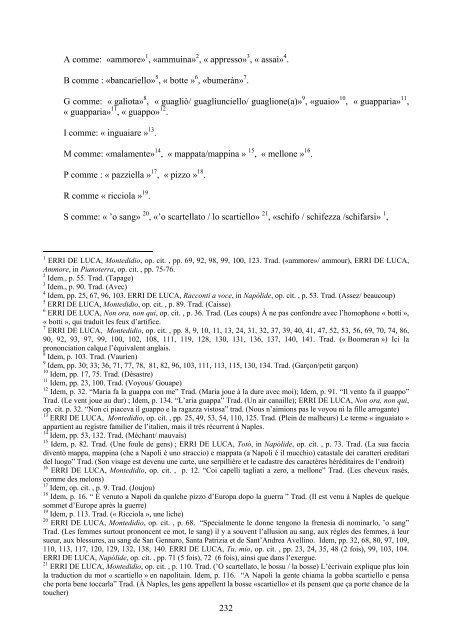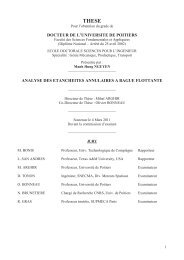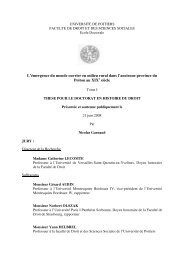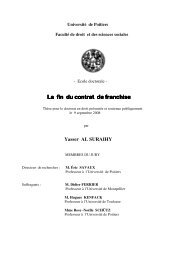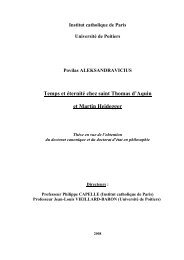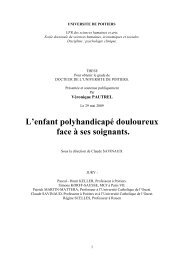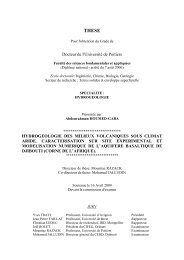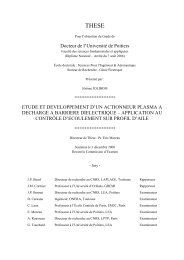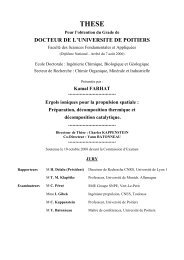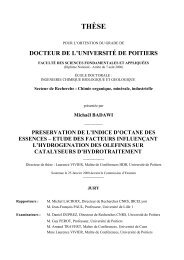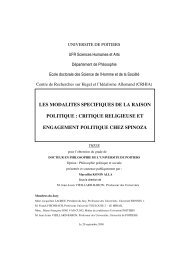Consulter le texte intégral de la thèse - Université de Poitiers
Consulter le texte intégral de la thèse - Université de Poitiers
Consulter le texte intégral de la thèse - Université de Poitiers
You also want an ePaper? Increase the reach of your titles
YUMPU automatically turns print PDFs into web optimized ePapers that Google loves.
A comme: «ammore» 1 , «ammuina» 2 , « appresso» 3 , « assai» 4 .<br />
B comme : «bancariello» 5 , « botte » 6 , «bumeràn» 7 .<br />
G comme: « galiota» 8 , « guagliò/ guagliunciello/ guaglione(a)» 9 , «guaio» 10 , « guapparia» 11 ,<br />
« guapparia» 11 , « guappo» 12 .<br />
I comme: « inguaiare » 13 .<br />
M comme: «ma<strong>la</strong>mente» 14 , « mappata/mappina » 15 , « mellone » 16 .<br />
P comme : « pazziel<strong>la</strong> » 17 , « pizzo » 18 .<br />
R comme « riccio<strong>la</strong> » 19 .<br />
S comme: « ’o sang» 20 , «’o scartel<strong>la</strong>to / lo scartiello» 21 , «schifo / schifezza /schifarsi» 1 ,<br />
1 ERRI DE LUCA, Montedidio, op. cit. , pp. 69, 92, 98, 99, 100, 123. Trad. («ammore»/ ammour), ERRI DE LUCA,<br />
Ammore, in Pianoterra, op. cit. , pp. 75-76.<br />
2 I<strong>de</strong>m., p. 55. Trad. (Tapage)<br />
3 I<strong>de</strong>m., p. 90. Trad. (Avec)<br />
4 I<strong>de</strong>m, pp. 25, 67, 96, 103. ERRI DE LUCA, Racconti a voce, in Napòli<strong>de</strong>, op. cit. , p. 53. Trad. (Assez/ beaucoup)<br />
5 ERRI DE LUCA, Montedidio, op. cit. , p. 89. Trad. (Caisse)<br />
6 ERRI DE LUCA, Non ora, non qui, op. cit. , p. 36. Trad. (Les coups) À ne pas confondre avec l’homophone « botti »,<br />
« botti », qui traduit <strong>le</strong>s feux d’artifice.<br />
7 ERRI DE LUCA, Montedidio, op. cit. , pp. 8, 9, 10, 11, 13, 24, 31, 32, 37, 39, 40, 41, 47, 52, 53, 56, 69, 70, 74, 86,<br />
90, 92, 93, 97, 99, 100, 102, 108, 111, 119, 128, 130, 131, 136, 137, 140, 141. Trad. (« Boomeran ») Ici <strong>la</strong><br />
prononciation calque l’équiva<strong>le</strong>nt ang<strong>la</strong>is.<br />
8 I<strong>de</strong>m, p. 103. Trad. (Vaurien)<br />
9 I<strong>de</strong>m, pp. 30; 33; 36, 71, 77, 78, 81, 82, 96, 103, 111, 113, 115, 130, 134. Trad. (Garçon/petit garçon)<br />
10 I<strong>de</strong>m, pp. 17, 75. Trad. (Désastre)<br />
11 I<strong>de</strong>m, pp. 23, 100. Trad. (Voyous/ Gouape)<br />
12 I<strong>de</strong>m, p. 32. “Maria fa <strong>la</strong> guappa con me” Trad. (Maria joue à <strong>la</strong> dure avec moi); I<strong>de</strong>m, p. 91. “Il vento fa il guappo”<br />
Trad. (Le vent joue au dur) ; I<strong>de</strong>m, p. 134. “L’aria guappa” Trad. (Un air canail<strong>le</strong>); ERRI DE LUCA, Non ora, non qui,<br />
op. cit. p. 32. “Non ci piaceva il guappo e <strong>la</strong> ragazza vistosa” trad. (Nous n’aimions pas <strong>le</strong> voyou ni <strong>la</strong> fil<strong>le</strong> arrogante)<br />
13 ERRI DE LUCA, Montedidio, op. cit. , pp. 25, 49, 53, 54, 110, 125. Trad. (P<strong>le</strong>in <strong>de</strong> malheurs) Le terme « inguaiato »<br />
appartient au registre familier <strong>de</strong> l’italien, mais il très récurrent à Nap<strong>le</strong>s.<br />
14 I<strong>de</strong>m, pp. 53, 132. Trad. (Méchant/ mauvais)<br />
15 I<strong>de</strong>m, p. 82. Trad. (Une fou<strong>le</strong> <strong>de</strong> gens) ; ERRI DE LUCA, Totò, in Napòli<strong>de</strong>, op. cit. , p. 73. Trad. (La sua faccia<br />
diventò mappa, mappina (che a Napoli è uno straccio) e mappata (a Napoli è il mucchio) catasta<strong>le</strong> <strong>de</strong>i caratteri ereditari<br />
<strong>de</strong>l luogo” Trad. (Son visage est <strong>de</strong>venu une carte, une serpillière et <strong>le</strong> cadastre <strong>de</strong>s caractères héréditaires <strong>de</strong> l’endroit)<br />
16 ERRI DE LUCA, Montedidio, op. cit. , p. 12. “Coi capelli tagliati a zero, a mellone” Trad. (Les cheveux rasés,<br />
comme <strong>de</strong>s melons)<br />
17 I<strong>de</strong>m, op. cit. , p. 9. Trad. (Joujou)<br />
18 I<strong>de</strong>m, p. 16. “ È venuto a Napoli da qualche pizzo d’Europa dopo <strong>la</strong> guerra ” Trad. (Il est venu à Nap<strong>le</strong>s <strong>de</strong> quelque<br />
sommet d’Europe après <strong>la</strong> guerre)<br />
19 I<strong>de</strong>m, p. 113. Trad. (« Riccio<strong>la</strong> », une liche)<br />
20 ERRI DE LUCA, Montedidio, op. cit. , p. 68. “Specialmente <strong>le</strong> donne tengono <strong>la</strong> frenesia di nominarlo, ’o sang”<br />
Trad. (Les femmes surtout prononcent ce mot, <strong>le</strong> sang) il y a souvent l’allusion au sang, aux règ<strong>le</strong>s <strong>de</strong>s femmes, à <strong>le</strong>ur<br />
sueur, aux b<strong>le</strong>ssures, au sang <strong>de</strong> San Gennaro, Santa Patrizia et <strong>de</strong> Sant’Andrea Avellino. I<strong>de</strong>m, pp. 32, 68, 80, 97, 109,<br />
110, 113, 117, 120, 129, 132, 138, 140. ERRI DE LUCA, Tu, mio, op. cit. , pp. 23, 24, 35, 48 (2 fois), 99, 103, 104.<br />
ERRI DE LUCA, Napòli<strong>de</strong>, op. cit. , pp. 71 (5 fois), 72 (6 fois), ainsi que dans l’exergue.<br />
21 ERRI DE LUCA, Montedidio, op. cit. , p. 110. Trad. (’O scartel<strong>la</strong>to, <strong>le</strong> bossu / <strong>la</strong> bosse) L’écrivain explique plus loin<br />
<strong>la</strong> traduction du mot « scartiello » en napolitain. I<strong>de</strong>m, p. 116. “A Napoli <strong>la</strong> gente chiama <strong>la</strong> gobba scartiello e pensa<br />
che porta bene toccar<strong>la</strong>” Trad. (À Nap<strong>le</strong>s, <strong>le</strong>s gens appel<strong>le</strong>nt <strong>la</strong> bosse «scartiello» et ils pensent que ça porte chance <strong>de</strong> <strong>la</strong><br />
toucher)<br />
232


